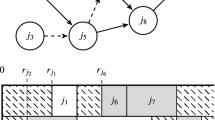Abstract
We consider the maximum lateness problem in which all tasks have the same executiontime and must be processed on m > 1 parallel identical processors subject to precedenceconstraints. All tasks and all processors are available at time t = 0, and each task has a duedate. If all due dates are zero, the maximum lateness problem converts to the makespanproblem, which is known to be NP-hard. We present a polynomial time algorithm thatenables us to obtain an optimal schedule for the case m = 2 and gives an approximate solutionfor the general case. The upper bound for this algorithm is derived and proved to be tight. Ifall due dates are zero, then the upper bound obtained coincides with the upper bound for theCoffman - Graham algorithm, which is the best known for the makespan problem.
Similar content being viewed by others
References
B. Braschi and D. Trystram, A new insight into the Coffman–Graham algorithm, SIAM J. Comput. 23(1994)662–669.
P. Brucker, M.R. Garey and D.S. Johnson, Scheduling equal-length tasks under tree-like precedence constraints to minimize maximum lateness, Math. Oper. Res. 2(1977)275–284.
E.G. Coffman, Jr. and R.L. Graham, Optimal scheduling for two-processor systems, Acta Inform. 1(1972)200–213.
M.R. Garey and D.S. Johnson, Scheduling tasks with nonuniform deadlines on two processors, J. Assoc. Comput. Mach. 23(1976)461–467.
S. Lam and R. Sethi, Worst case analysis of two scheduling algorithms, SIAM J. Comput. 6(1977)518–536.
E.L. Lawler, J.K. Lenstra, A.H.G. Rinnooy Kan and D.B. Shmoys, Sequencing and scheduling: Algorithms and complexity, in: Logistics of Production and Inventory, eds. S.C. Graves, A.H.G. Rinnooy Kan and P.H. Zipkin, Elsevier Science, 1993.
J.K. Lenstra and A.H.G. Rinnooy Kan, Complexity of scheduling under precedence constraints, Oper. Res. 26(1978)22–35.
J.D. Ullman, NP-complete scheduling problems, J. Comput. System Sci. 10(1975)384–393.
Y. Zinder, Deterministic service systems with identical processors, in: Proceedings of the 2nd Scientific Conference of Young Scientists of the Mathematical Faculty of Gorky University, 3538-77 Dep., 1977, pp. 82–98 (in Russian).
Rights and permissions
About this article
Cite this article
Zinder, Y., Roper, D. An iterative algorithm for scheduling unit-time taskswith precedence constraints to minimisethe maximum lateness. Annals of Operations Research 81, 321–343 (1998). https://doi.org/10.1023/A:1018917426360
Issue Date:
DOI: https://doi.org/10.1023/A:1018917426360




